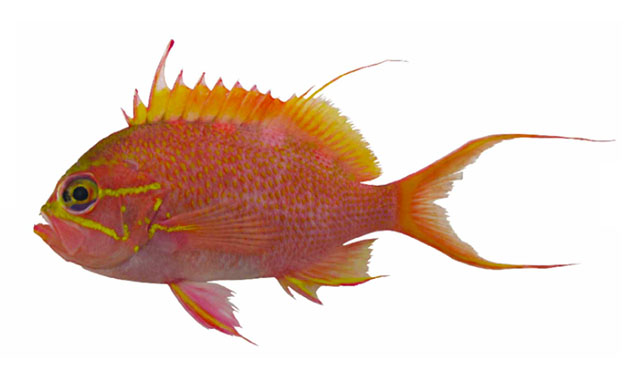| Anthiadidae (Fairy basslets or Streamer basses) |
| 21.2 cm SL (male/unsexed) |
|
benthopelagic; marine |
| Indo-Pacific: Indonesia. Tanjung Luar fish landing site, Lombok, East Nusa Tenggara (Ref. 87803). |
|
Dorsal spines (total): 10; Dorsal soft rays (total): 16-17; Anal spines: 3; Anal soft rays: 7. Body depth 2.2–2.5 in SL; spine at angle of preopercle moderately long, extending about half distance to margin of subopercle; vomerine tooth patch arrowhead-shaped; no teeth on mesopterygoids; scales dorsally on snout nearly reaching upper lip; 3rd dorsal spine elongate, 1.36–2.32 in head length; 3rd ray of dorsal fin the longest, greatly produced as a long filament; 2nd anal spine subequal to third, 2.32–2.78 in head length; caudal fin lunate, the lobes very long and filamentous, fin length 1.37–2.01 in SL. Colour when fresh mostly pink; scales on upper half of body each with a bright yellow spot; head pinkish with a vivid yellow, horizontal V-shaped marking originating on snout tip and extending posteriorly as two stripes; lower stripe running posteroventrally below eye to edge of opercle; upper stripe running posterodorsally through about the middle of eye to edge of the opercle just above primary opercular spine; nape yellowish; four pale pinkish blotches present below dorsal fin base; dorsal fin mostly yellow with some pink areas; anal fin pinkish with yellow pigment between second and third spines extending on to posterior portion of posteriorly adjacent fin membranes; caudal fin mostly pink with yellow pigment basally and extending along centre of filamentous lobes; pectoral fins pinkish with yellow stripe on anterior third extending from base of fin to about one-third distance of longest rays; pelvic fin mostly pink with yellow pigment on membrane between first and second soft rays (Ref. 87803). |
|
|
Not Evaluated (N.E.) Ref. (130435)
|
| harmless |
Source and more info: www.fishbase.org. For personal, classroom, and other internal use only. Not for publication.
